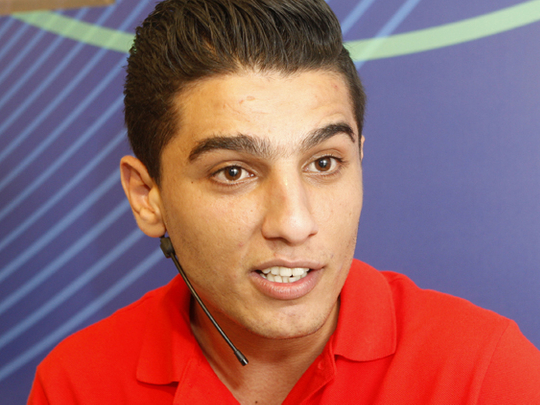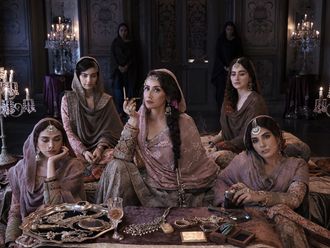
“This a dangerous confession I’m about to make, but I don’t have a problem leaving,” Mohammad Assaf says, voice lowered and head ducked close.
It’s a Tuesday afternoon in Dubai. Cameras are pointed at him, live-streaming his every move. He’s in a tightly-packed studio as part of a 24-hour project with renowned producer Rodney Jerkins. Together, they’re creating a song from scratch that Assaf will sing on June 10 in Sao Paulo, Brazil, at the opening ceremony of the Fifa Congress — the first Arab to do so.
“It’s a huge honour for me to represent Arabs at an event this big,” Assaf tells tabloid! with a sparkle in his eyes. “It means a lot to me, both on a personal level and as an Arab ... We’re in a very exciting moment right now.”
Through a Twitter hashtag, ASSAF360, fans were able to send in lyrical suggestions for the eponymous song over the span of two weeks. The resulting tune is perfectly polished, an exhilarating rush of electro beats, background claps and just enough pronounced drum beats to get the blood flowing. Assaf, who enhanced his heartthrob status on Arab Idol one week by singing I Want It That Way by the Backstreet Boys, even flaunts his English on the track.
“Wake up and feel alive, this is your night, just sing now, ‘Yallah, yallah!’ One heart, one love, one pride, I’m on your side, we will survive, yallah, yallah,” he sings in his convincing timbre.
Pop culture sensation
As the hours pass in the recording studio, Assaf is shepherded from interview to interview, told where to sit and who to talk to, and he does so with a grin. When he confesses he has no problem leaving, he’s talking about this — the industry, the fame and his new life since winning Arab Idol last June. In a year, he’s become everything from a pop culture sensation to a goodwill ambassador with the United Nations Relief and Works Agency for Palestine Refugees in the Near East (UNRWA). His disposition is sunny if tired, his signature pearly whites brighter than his glaring red Polo shirt and matching sneakers.
When he was four years old, Assaf moved with his family to Khan Yunis Camp in the southern Gaza Strip. When he was 23, he took his dream of becoming famous outside Palestine, driving to the Egypt-based auditions of Arab Idol. Stuck at the border for two days, he arrived late to the hotel where auditions were being held and had to jump a wall to get in. Even then, he was refused a number to audition and sat in the hall dejectedly singing to other contestants. One of them handed Assaf his own number, believing in his big voice. It wouldn’t be the last time.
These days, whenever Assaf goes back to Ramallah in Palestine, there are at least 400 or 500 strangers coming up to him for pictures, hugs and kisses, driven by a feeling that Assaf belongs to each and every one of them. Those are just the ones he can count.
“There are days when I go to places that are crowded and I have to run away, because I don’t know what to do,” he admits. He loves nothing more than to make people happy, especially his fellow Palestinians, but he often reaches certain levels of exhaustion. “I can’t speak — because if I say it, it’s going to be misunderstood. I can’t say ‘I’m tired’, because some people will take it the wrong way. They’ll think, ‘Oh, he doesn’t want to take a picture with me,’ and it’s not like that.”
But it hasn’t always been this hectic. Assaf is a self-professed minimalist who loves simplicity. He can’t bring himself to be a phony pop star and repeatedly insists he can’t spout lies. What he really wants is to go back home to his friends, Abu Ala’a and Abu Hassan, and to walk the streets of Palestine on his own time. It isn’t that he can’t leave his old ways behind — it’s just that he doesn’t want to.
Getting nostalgic
“I used to go every day to my friend’s place, his name is Ala’a,” he recalls. “I used to go on the rooftop — their house is tiny, and I used to go up on his rooftop and we would drink tea and we would talk about absolutely everything. The rest of the boys would come over, and we’d spread out on the rooftop in the summer, and we’d just drink tea and play cards — those were some good times.”
Does that mean he regrets going after his dream?
“I don’t regret it. But there are times when I say to myself: ‘oh God, what compelled me to do this?’ Sometimes, it gets to me,” he says. “Maybe the only thing that I get joy out of in my job is when I’m on the stage. That’s the only thing I enjoy, truly, from my heart.”
What Assaf has achieved now is bigger than anything he’d ever dreamed of. As someone who considers himself a social person — and despite his large in-person entourage, over 700,000 Twitter followers and over 2,300,000 Facebook fans — he still finds himself feeling alone. Even when it comes to romance, he has no time to fall in love.
“The telephone isn’t enough. My friends will call me to tell me about something that happened back home, and I get so bothered by it. I wish I was with them. I inherited a lot of responsibility at a young age, you know? What happened to me was difficult,” he says.
Family far away
But Assaf’s camp is never empty. He’s perpetually surrounded by people who adore him and people who tell him time and time again that they’re his family now, from his fans to his crew. For Assaf, one of six siblings whose actual family remains miles and miles away, it isn’t always enough.
“I have no mother, no father, no brother, no sister close to me. I live alone. Even in Dubai, I live alone. My friends tell me — come on, man, live your life, be happy. But I don’t know how to live alone.” He gives a hearty laugh. “If it was up to me, I’d bring them all here — I swear to God!”
The pressure of being a public figure aside, there is something that does make him feel right at home: being a goodwill ambassador with the UNRWA. Through his work with the organisation, which provides educational and health-related services, Assaf has been able to help collect donations and rally for support of 5,000,000 Palestinian refugees in Jordan, Lebanon and Syria.
“I’m really happy when I’m doing it. I’m from a refugee camp, and I’m a refugee, so to be able to give back, even in a small way, even with words, it gives them hope. I know people are thinking, ‘What are we gonna do with hope?’ But trust me, a nice word helps,” he says. “This is a duty and a responsibility that’s been thrust upon me, and I’m going to support this cause until the last day of my life.”
As for the rest of it — the industry, the fame and his new life? Only time will tell where it will take him and whether or not he’ll leave it behind.
“Before celebrity, to me, my life was calmer and better,” Assaf laments. “Today, what I do is beautiful and I’m happy with it, but I’m very nostalgic for the old times when I did whatever I wanted to do and whatever crossed my mind.”
*The song, ASSAF360, is available now on Anghami+ and iTunes. 100 per cent of proceeds from downloads will support UNRWA.








